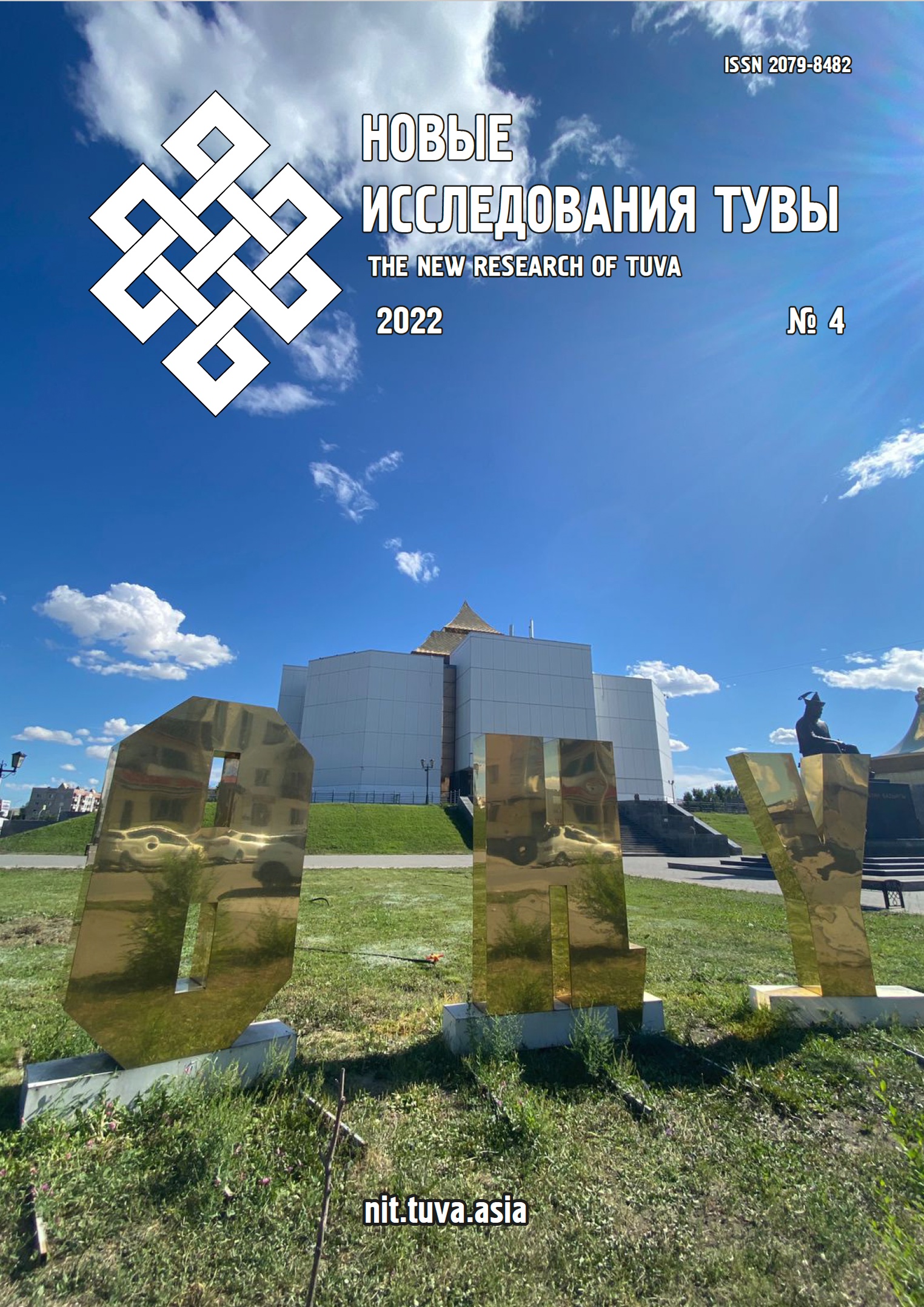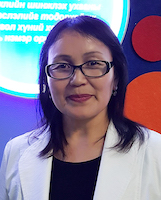Teaching the Tuvan language to children of ethnic Tuvans in Mongolia
DOI:
https://doi.org/10.25178/nit.2022.4.5Keywords:
Tuvan language; Tuvans of Mongolia; Tsengel Tuvans; Tsengel; MongoliaAbstract
The article summarizes some issues of teaching the native (Tuvan) language to children of ethnic Tuvans who mostly live in the sums of Tsengel in Bayan-Ölgii aimag, Buyant in Khovd aimag and Tsagaan-Nuur in Khövsgöl aimag. The authors rely on the data acquired during dialectological and complex expeditions conducted from 1999 to 2019, as well during business trips to these sums.
Children of ethnic Tuvans are being taught their native language in Mongolia, but this process is accompanied by a number of problems. The Ministry of Education and Science of Mongolia and the sector for the education of children of small nations in schools of the National Institute for Educational Research try to create conditions for the preservation of the native (Tuvan) language of children of ethnic Tuvans in Tsengel in consultation with researchers and methodologists of Tuvan State University (TuvSU, Russia). Children have the opportunity to learn their native language from grades 1 to 9 according to programs compiled with the participation of scholars and methodologists of TuvSU. Textbooks have been written on their basis. However, as practice has shown, it is impossible to use these textbooks prepared by Tuvan authors effectively due to the lexical, grammatical and phonetic dialect features of the speech of the Tsengel Tuvans. In Tsagaan-Nuur and Khovd schools, education is carried out in the Mongolian language, so Tsagaan-Nuur children learn their mother tongue in the activity club, and children of the Khovd Tuvans do not learn it at all.
The level of Tuvan language proficiency among children and youth living in these aimags is alarming: Tuvan mainly serves as a language of communication in the family circle, and the number of children who do not speak their native language is growing each and every year.
References
Bavuu-Surun, M. V. (2010) Problema obucheniia rodnomu (tuvinskomu) iazyku v usloviiakh polilingvizma Severo-Zapadnoi Mongolii [Issue of teaching native (Tuvan) language in the conditions of polylinguism of north-western Mongolia]. In: Regiony Rossii dlia ustoichivogo razvitiia: obrazovanie i kul'tura narodov Rossiiskoi Federatsii [Russian regions for sustainable development: Education and culture of peoples in the Russian Federation] : Proceedings of the International conference. Novosibirsk, Ofset. 1144 p. Pp. 307–311. (In Russ.).
Bavuu-Surun, M. V. (2012) Problema adaptatsii detei tuvinskikh skotovodov k shkol'nomu obucheniiu v usloviiakh sumona Tsengel Baian-Ulegeiskogo aimaka Mongolii [Issue of Tuvan cattle breeders’ children adaptation to school education in conditions of Tsengel sum of Bayan-Ölgii Province of Mongolia]. Vestnik Tuvinskogo gosudarstvennogo universitete. Sotsial'nye i gumanitarnye nauki, no. 1 (12), pp. 62–64. (In Russ.).
Gansukh, Kh. and Tuya, U. (2016) Izuchenie tuvinskogo iazyka v Mongolii [Learning the Tuvan language in Mongolia]. Vestnik Tuvinskogo gosudarstvennogo universiteta. Pedagogicheskie nauki, no 4 (31), pp. 121–124. (In Russ.).
Gansukh, Kh. and Bavuu-Surun, M. V. (2016) Iazyk i fol'klor tuvintsev Mongolii v bazakh dannykh elektronnykh resursov na tuvinskom iazyke [Language and folklore of ethnic Tuvans in Mongolia in Tuvan electronic databases]. New Research of Tuva, no. 4, pp. 77–87. (In Russ.).
Damba, N. Ch. (2011) Osobennosti tsengelskoi nachal'noi shkoly Mongolii [Features of Tsengel primary school of Mongolia]. Vestnik Tuvinskogo gosudarstvennogo universiteta. Pedagogicheskie nauki, no. 4 (11), pp. 6–9. (In Russ.).
Damba N. Ch. (2012) Varianty posledovatel'nosti izucheniia zvukov i bukv v 1 klasse tsengelskoi nachal'noi shkoly Mongolii [Options for a consistent study of sounds and letters in first grade at the Tsengel primary school of Mongolia]. Vestnik Tuvinskogo gosudarstvennogo universiteta. Pedagogicheskie nauki, no. 4 (15), pp. 86–89. (In Russ.).
Kara-ool L. S. (2012) Nachalnaia tuvinskaia shkola Tsengelia [Primary Tuvan Tsengel School]. New Research of Tuva, no. 4, pp. 148–152. (In Russ.).
Lamazhaa, Ch. K. (2021) Osnovnye problemy issledovaniia rodstva i rodstvennykh grupp sovremennykh tuvintsev: pasportizatsiia, terminologiia i podderzhanie rodstva [The main issues of the study of kinship and kin groups of contemporary Tuvans: Passportization, terminology and maintenance of kinship]. New Research of Tuva, no. 4, pp. 6–21. (In Russ.). DOI: https://doi.org/10.25178/nit.2021.4.1
Mongush, M. V. (2013) U tuvintsev Tsengela [At Tuvans of Tsengel]. New Research of Tuva, no. 2, pp. 26–43. (In Russ.).
Suvandii, N. D. (2021) Terminy rodstva u rodovoi gruppy mongushei s. Aiangaty Barun-Khemchikskogo raiona [Kinship terms of the Mongush tribal group of the Village of Ayangaty in the Barun-Khemchik District]. New Research of Tuva, no. 4, pp. 22–30. (In Russ.). DOI: https://doi.org/10.25178/nit.2021.4.2
Suvandii, N. D., Kara-ool, L.S. and Bolormaa, B. (2019) Baryyn Moolduӊ Tsengel sumuzunuӊ toponimneri [Toponyms of the sum of Tsengel in western Mongolia]. Kyzyl, Tuvan State University Publishing House. 86 p. (In Tuv.).
Yusha, Zh. M. (2015) Tuvintsy Kitaia i Mongolii: sovremennoe sostoianie fol'klornoi traditsii [The Tuvinians of China and Mongolia: Current state of the folklore tradition]. Sibirskii filologicheskii zhurnal, no. 2, pp. 5–10.
Published
How to Cite
For citation:
Kara-ool L. S. and Gansukh H. Obuchenie tuvinskomu iazyku detei etnicheskikh tuvintsev Mongolii [Teaching the Tuvan language to children of ethnic Tuvans in Mongolia]. New Research of Tuva, 2022, no. 4, pp. 65-77. (In Russ.). DOI: https://doi.org/10.25178/nit.2022.4.5
Issue
Section

This work is licensed under a Creative Commons Attribution-NonCommercial 4.0 International License.

Author(s) license holder(s) grant rights for their work to the journal (grantee of a license) under the simple non-exclusive open license in accordance with Art. 1286.1 «Open license for a research work, work of literature or fine arts», Civil Code of the Russian Federation.
New Research of Tuva publishes articles under the Creative Commons Attribution-NonCommercial license (CC BY-NC).
Since it is an open license, author(s) reserve the right to upload the article to their institutional repository, submit it to another journal (if it allows republications), or republish it on their own website (in full, or in part).
However, several conditions apply here:
a) The republished version must always contain the name(s) and affiliation(s) of the author(s), the original title and the hyperlink to the original version on the New Research of Tuva website;
b) It must be in open access, free of charge, and no category of readers must be in any way whatsoever advantaged over general readership.
c) should the contribution be submitted elsewhere by its author(s) without substantial modification (30% or more of original text unchanged), the body of the article should contain a disclaimer that the original version was published in New Research of Tuva (with a link to the respective page)
The CC-BY-NC is a non-revocable license which applies worldwide and lasts for the duration of the work’s copyright.










